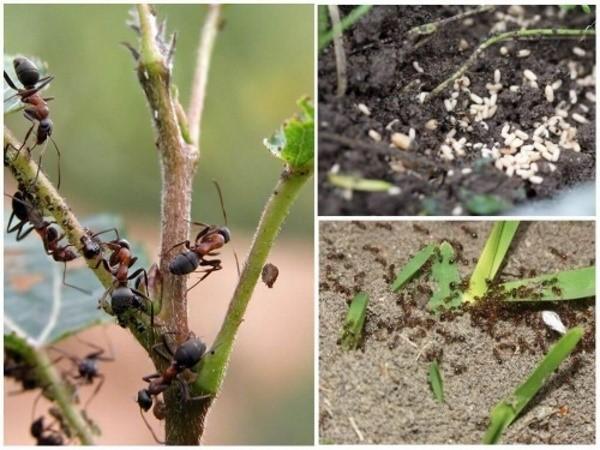How To Get Rid Of Garden Ants: Don't Give Them A Chance To Kill Your Harvest
 Ants live almost everywhere and can adapt to any conditions, but they are especially numerous in the garden. Despite the fact that they help to destroy small pests, the problem remains: how to get rid of garden ants. During the ripening period of fruits and berries, they cause irreparable damage by feeding on them. What else are ants dangerous for the garden, and how to save the crop?
Ants live almost everywhere and can adapt to any conditions, but they are especially numerous in the garden. Despite the fact that they help to destroy small pests, the problem remains: how to get rid of garden ants. During the ripening period of fruits and berries, they cause irreparable damage by feeding on them. What else are ants dangerous for the garden, and how to save the crop?
What is the harm from ants in the garden
Eaten apples or Strawberry - not all, it is much more unpleasant and more dangerous that these insects carry aphids to garden plants. Ants feed on the secretions of aphids, in addition, they are her protection. For both insects, this is a "mutually beneficial collaboration", but gardeners know how plants suffer from aphids. Getting rid of it is also not easy, but first you need to drive out the ants.
Do not forget that an anthill can be located anywhere: under cherries, currants, on a strawberry bed, and even in a flower garden. During the construction process, ants inevitably damage the small roots of various crops. As a result, the latter may die. There are even species of ants that feed on plant sap. Of course, they cannot eat a whole gooseberry bush, but it is easy to damage the shell and make it vulnerable.
Nimble insects are especially harmful to young tender shoots. Digging burrows and passages nearby, they cover them with earth. And some seeds are simply dragged from the garden immediately after sowing to their home, making supplies.
In the process of vital activity, ants secrete acid, which gradually accumulates in the soil. This increases the acidity of the soil around the nest, which is not to the liking of many crops growing nearby.
How to get rid of garden ants
One of the most effective and radical ways is the use of insecticides. But they should be used only in the most extreme cases, when the invasion is already catastrophic. Insecticides act not only on insects, but also on garden crops. And during the ripening and harvesting period, their use is generally prohibited. But there are drugs that, when used correctly, do not have a negative effect on the garden.
Fighting ants with acid
For example, if red or black neighbors have settled on your site, try to discourage them in the following ways:
- Spill the area with the anthill regularly with a dilute solution of acid (acetic, citric, hydrochloric, sulfuric). While releasing acid, the ants themselves do not like it and will soon leave.
- Place boric acid traps on site. To do this, in 2 tbsp. l. Dissolve 1/3 tsp of warm water. acid and add 1 tbsp. l. Sahara. Stir, pour into a saucer and place near the nest. After a couple of days, replace the solution with a fresh one. The peculiarity of this method is that ants do not die from acid immediately, but after 3-4 days. During this time, they manage to transfer the sweet, but deadly, syrup to the dwelling and feed the larvae and the uterus with it. As a result, everyone dies and you can get rid of the entire colony.
Do not increase concentration for boric acid traps. Then the insects will die on the spot and will not have time to poison the entire anthill.
Folk remedies against ants in the garden
From the practice of gardeners it is noted that it is no less effective to fight ants with folk remedies using:
- Garlic.Chop a head of garlic, pour 1 liter of warm water and let stand for 2 hours. Fill the anthill with this infusion. Repeat the procedure for a couple of days and the insects will go away.
- Orange peels (other citrus fruits will work as well). Also make a tincture and pour it into the ant's dwelling.
- Certain plants with a pungent odor (wormwood, celandine, black elderberry). Their broths can also be poured over the habitats of pests.
- Yeast. Crumble some fresh yeast into an old plate, add the same amount of sugar. Cover with warm water and leave near the nests.
To get rid of ants in the garden, some gardeners recommend mechanical methods. These include digging up an anthill or spilling it with boiling water. However, they are unlikely to give the desired effect. The female ant is very deep, up to 1 m underground. You can't get it with a shovel, and the boiling water won't get there either. But if you dig up an anthill with the simultaneous introduction of ash or sunflower oil, it is quite possible to see the result. Insects do not tolerate wood ash and heavy sunflower aroma and will leave.